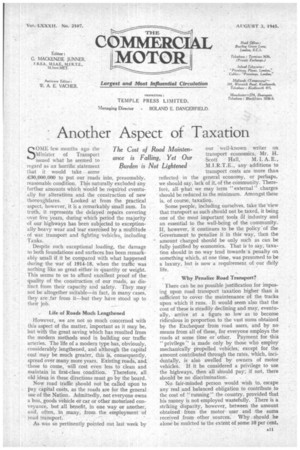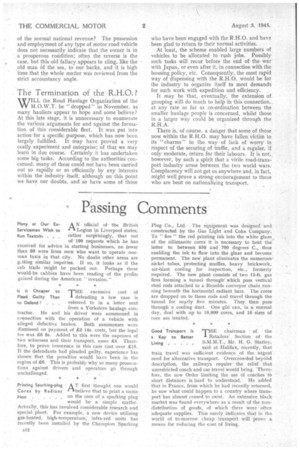Another Aspect of Taxation
Page 13

Page 14

If you've noticed an error in this article please click here to report it so we can fix it.
SOME few months ago the Minister of Transport issued what he seemed to regard as an horrific statement that it would take some R30,000,000 to put our roads into, presumably, reasonable condition. This naturally excluded a:ny further amounts which w7ould be required eventually for alterations and the construction of new thoroughfares. Looked at from the practical aspect, however, it is a remarkably small sum. In truth, it represents the delayed repairs covering over five years, during which period the majority of our highways has been subjected to exceptionally heavy wear and tear exercised by a multitude of war transport and fighting vehicles, including Tanks.
Despite such exceptional loading, the damage to both foundations and surfaces has been remarkably small if it be compared with what happened during the war of 1914-18, when the traffic was nothing like so great either in quantity or weight. This seems to us to afford excellent proof of the quality of the construction of our roads, as distinct from their capacity and safety. They may not be altogether suitable—in fact, in many cases, they are .far from it—but they have stood up to their job.
Life of Roads Much Lengthened However, we are not so much concerned with this aspect of the matter, important as it may be, but with the great saving which has resulted from the modern methods used in building our traffic arteries. The life of a modern type has, obviously, considerably lengthened, and although the capital cost may be much greater, this is, consequently, spread over many more years. Existing roads, ancl those to come, will cost even less to clean and maintain in first-class condition. Therefore, all old Ideas in these directions must go by the board.
Now road traffic should not be called uponto pay capital costs, as the roads are for the general use of the Nation. Admittedly, not everyone owns a bus, goods vehicle or car or other motorized conveyance, but all benefit, in one way or another, and, often, in many, from the employment of mad transport. , As was so pertinently pointed out last week by our well-known writer on transport economics, Mr. H.
• Scott Hall, M. I. A. E., M.I.R.T.E., any additions to transport .costs are more than reflected in the general economy, or perhaps, we should say, lack of it, of the community. Therefore, all what we may term " external " charges should be reduced to the minimum. Amongst these is, of course, .taxation. Some people, including ourselves, take the view that transport as such should not be taxed, it being one of the most important tools 5f industry and an essential to the well-being of the community. If, however, it continues to be the policy: of the Government to penalize it in this way, then the amount charged should be only such as can be fully justified by economics. That is to say, taxation should in no way tend towards-a penalty on something which, at one time, was presumed to be a luxury, but is now a requirement of our daily life.
Why Penalize Road Transport?
There can be no possible justification for imposing upon road transport taxation higher than is sufficient to cover the maintenance of the tracks upon which it runs. • It would seem also that the cost of these is steadily declining and may, eventually, arrive at a figure so low as to become ridiculous in proportion to the vast sums obtained by the Exchequer from road users, and by no means from all of these, for everyone employs the roads at some time or other. Payment for this " privilege " is made only by those who employ mechanically propelled vehicles; except for the amount contributed through the rates, which, incidentally, is also swelled by owners of motor vehicles. If it be considered a privilege to use the highways, then all should pay; if not, there should be no discrimination.
No fair-minded person would -wish to, escape any real and balanced obligation to contribute to the cost of "running" the country, provided that his money is not employed wastefully. There is a striking disparity, however, between the amount obtained from the motor user and the sums received from other sources: Why should he alone be mulcted to the extent of some 10 per cent. of the normal national revenue? The possession and employment of any type of motor road vehicle does not necessarily indicate that the owner is in a prosperous condition; often the reverse is the case, but this old fallacy appears to cling, like the old man of the sea, to our backs, and it is high time that the whole matter was reviewed from the strict accountancy angle.
The Termination of the R.H.O.?
WILL the Road Haulage Organization of the M.O.W.T. be "dropped" in November, as many hauliers appear to hope and some 'believe? At this late stage, it is unnecessary to enumerate the various arguments for and against, the formation of this considerable fleet. It was put into action for a specific purpose, which has now been largely fulfilled. It may have proved a very costly experiment and enterprise; of that we may learn in due course. Certainly it has undertaken some big tasks. According to the authorities concerned, many of these could not have been carried out so rapidly or so efficiently by any interests within the industry itself, although on this point we have our doubts, and so have some of those who have been engaged with the R.H.O. and have been glad to return to their normal activities. At least, the scheme enabled large numbers of vehicles to be allocated to rnsh jobs. Possibly such tasks will recur before the end of the war with Japan, or even after it,.in connection with the housing policy, etc. Consequently, the most rapid way of dispensing with the R.H.O. would be for the industry to organize itself to meet demands for such work with expedition and efficiency. It may be that, eventually, the extension of grouping Will do much to help in this connection, at any rate so far as co-ordina,tion between the smaller haulage people is concerned, whilst those in a larger way could be organized through the R.H.A. There is, of course, a danger that some of those now within the R.H.O. may have fallen victim to its " charms " in the way • of lack of worry in respect of the securing of traffic, and a regular, if only moderate, return for their labours. It is not, however, by such a spirit that a virile road-transport industry arose between the two world wars. Complacency will not get us anywhere and, in fact, might well prove a strong encouragement to those who are bent on nationalizing transport.




















































